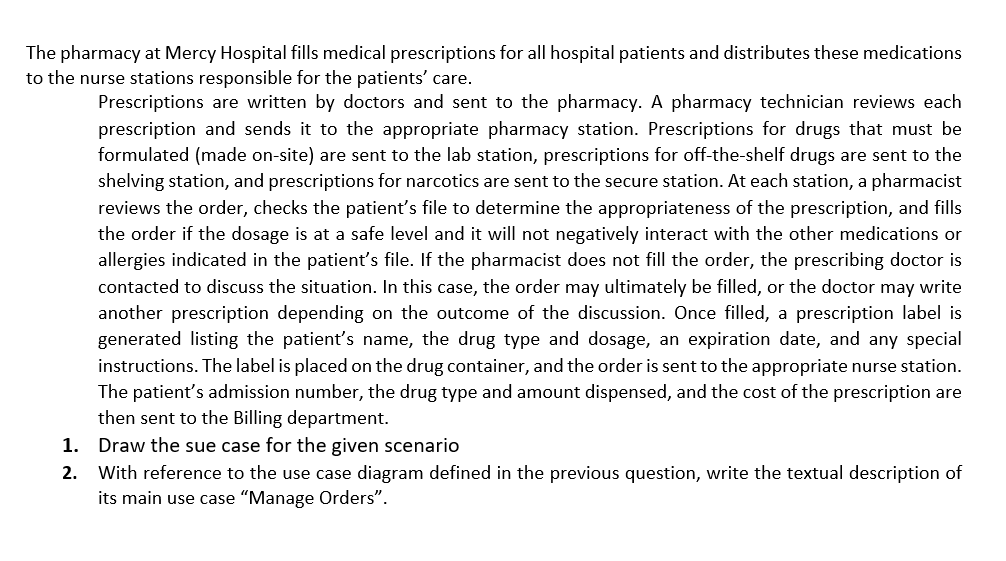
The pharmacy at Mercy Hospital fills medical prescriptions for all hospital patients and distributes these medications to the nurse stations responsible for the patients' care. Prescriptions are written by doctors and sent to the pharmacy. A pharmacy technician reviews each prescription and sends it to the appropriate pharmacy station. Prescriptions for drugs that must be formulated (made on-site) are sent to the lab station, prescriptions for off-the-shelf drugs are sent to the shelving station, and prescriptions for narcotics are sent to the secure station. At each station, a pharmacist reviews the order, checks the patient's file to determine the appropriateness of the prescription, and fills the order if the dosage is at a safe level and it will not negatively interact with the other medications or allergies indicated in the patient's file. If the pharmacist does not fill the order, the prescribing doctor is contacted to discuss the situation. In this case, the order may ultimately be filled, or the doctor may write another prescription depending on the outcome of the discussion. Once filled, a prescription label is generated listing the patient's name, the drug type and dosage, an expiration date, and any special instructions. The label is placed on the drug container, and the order is sent to the appropriate nurse station. The patient's admission number, the drug type and amount dispensed, and the cost of the prescription are then sent to the Billing department. 1. Draw the sue case for the given scenario 2. With reference to the use case diagram defined in the previous question, write the textual description of its main use case Manage Orders. The pharmacy at Mercy Hospital fills medical prescriptions for all hospital patients and distributes these medications to the nurse stations responsible for the patients' care. Prescriptions are written by doctors and sent to the pharmacy. A pharmacy technician reviews each prescription and sends it to the appropriate pharmacy station. Prescriptions for drugs that must be formulated (made on-site) are sent to the lab station, prescriptions for off-the-shelf drugs are sent to the shelving station, and prescriptions for narcotics are sent to the secure station. At each station, a pharmacist reviews the order, checks the patient's file to determine the appropriateness of the prescription, and fills the order if the dosage is at a safe level and it will not negatively interact with the other medications or allergies indicated in the patient's file. If the pharmacist does not fill the order, the prescribing doctor is contacted to discuss the situation. In this case, the order may ultimately be filled, or the doctor may write another prescription depending on the outcome of the discussion. Once filled, a prescription label is generated listing the patient's name, the drug type and dosage, an expiration date, and any special instructions. The label is placed on the drug container, and the order is sent to the appropriate nurse station. The patient's admission number, the drug type and amount dispensed, and the cost of the prescription are then sent to the Billing department. 1. Draw the sue case for the given scenario 2. With reference to the use case diagram defined in the previous question, write the textual description of its main use case Manage Orders







